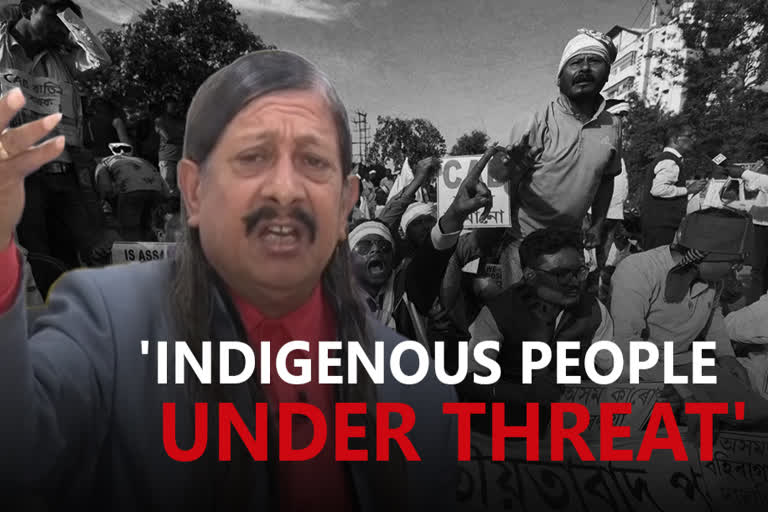New Delhi:As the nationwide stir against the Citizenship Amendment Act intensifies, ETV Bharat spoke to Matiur Rahman, a petitioner in the case. Rahman came down hard on the government, stressing that it was helping the foreigners rather than the indigenous people of Assam.
Rahman, who is the working president of Assam Sanmilita Mahasangha, spoke at length about the woes of the indigenous people of Assam, and how the new Act endangers their identity.
Here are some excerpts from the interview:
Rahman said that it was important to look back at the 1826 Treaty of Yandabo 'British forcibly occupied Assam, brought in foreigners'
Stating that the issue of foreigners was not new and had been plaguing Assam for 73 years, Rahman said that it was important to look back at the 1826 Treaty of Yandabo to understand the issue.
He explained that Clause 2 of the treaty signed between the British and Kingdom of Ava (Burma) clearly stated that the Burmese aggression was overcome, and as a result, Assam, Manipur, and Jaintia were independent.
"But the British forcefully occupied Assam. In 1822 they had even issued a notification declaring that their Army had not come to occupy Assam," he said, adding that the British pounced upon the opportunity when the King of Assam requested their help to drive away the Burmese.
"It was earlier declared that Assam would form a peaceful government as desired by the King and the people, but the British occupied the land," he said.
Rahman went on to claim that only to continue the British rule over Assam, foreigners were picked up from different locations and sent to Assam.
He said at least 25 lakh indigenous people do not own land 'Assam over-burdened, indigenous people don't have homes'
Stressing that Assam was overburdened with the heavy influx of foreigners, Rahman said that the state did not have the capacity to house more people.
"From 30 lakh, the population of foreigners has crossed one crore now. Our rivers are eating away our land. Villages are getting flooded. At least 25 lakh indigenous people do not have land. How can we have more people coming in," he said, adding that many indigenous people had to flee from their own homes because of foreigners.
Rahman strongly criticised the government 'How can aggressors be given citizenship?'
Strongly criticising the government, Rahman said that it needs to try and understand the actual situation on ground and come up with a solution as it was a matter of India's security and sovereignty.
"As you have liberated Bangladesh, the infiltrators are your responsibility. You are nursing them. Clearly state whether you have the capacity to deal with the issue," he said, adding that giving refuge to someone did not mean granting them citizenship.
"In 2005, when the Supreme Court scrapped the Illegal Migrants (Determination by Tribunal) Act (IMDT Act), it clearly identified the infiltrators as aggressors. How can aggressors be given citizenship?" he questioned.
He said any law must be uniformly applied 'CAA tool to instigate tribal vs non-tribal fight'
On being asked whether the presence of a large number of diverse communities was making the situation complex in Assam, Rahman said that the CAA can also be viewed as an instrument for instigating a 'tribal vs non-tribal' fight, as sixth schedule regions were exempted from the Act.
He said this was clear discrimination, and added that any law must be uniformly applied.
"Our language and culture are under threat. Most of the foreigners are Bengali-speaking, their habits are different," he said, adding that NRC on the basis of the 1971 cut-off would bring down the percentage of the indigenous population in Assam to just 15 per cent from the present 48 per cent.
Rahman further added that most of the hilly regions of the state were occupied by Nepalis, whereas Bangladeshis occupied the tribal belts and blocks.
"Nepal is a friendly country, but the foreigners are living here for free. The government is actually helping the foreigners," Rahman said, ruing the 'detribalisation' in Assam's Tribal belts and blocks.
Read: Tribal population is deprived of constitutional fundamental rights: CAA petitioner
